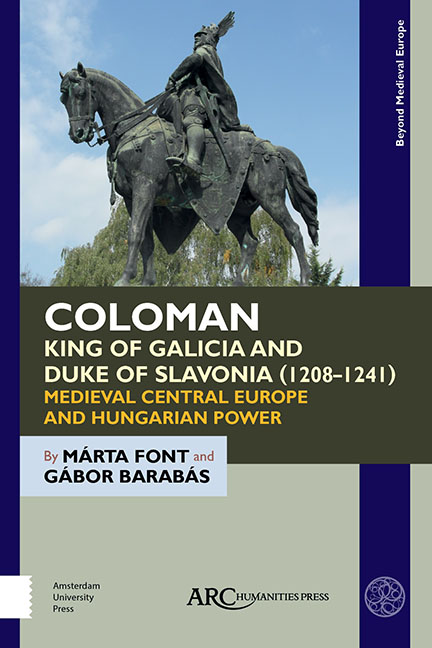 Coloman, King of Galicia and Duke of Slavonia (1208–1241)
Coloman, King of Galicia and Duke of Slavonia (1208–1241) Book contents
- Frontmatter
- Contents
- List of Illustrations
- Foreword
- Introduction
- PART ONE COLOMAN AS CHILD RULER OF GALICIA
- Chapter 1 The Galician Context in 1205
- Chapter 2 The Agreement of Scepus
- Chapter 3 Coloman’s Coronation as King of Galicia: Date and Place
- Chapter 4 The Hungarian Elite and Coloman’s Court
- Chapter 5 Coloman’s Position in Halych, 1215–22: Campaigns and Opponents
- Chapter 6 Upholding the Galician Claim: Coloman’s Place in Hungary
- PART TWO COLOMAN, DUKE OF WHOLE SLAVONIA (1226–1241)
- Chapter 7 Coloman and Scepus, Before 1226
- Chapter 8 Coloman as Duke of Whole Slavonia from 1226
- Chapter 9 Coloman’s Status and the Inner Workings of the Duchy
- Chapter 10 Coloman’s Ecclesiastical and Secular Actitivities in Slavonia
- Chapter 11 Coloman’s Rule in Slavonia
- Chapter 12 Politics and Dynastic Affairs
- Chapter 13 Challenges in the Balkans
- Chapter 14 The Mongol Attack and Coloman’s Death
- Conclusion: Coloman in the Eyes of Posterity
- Bibliography
- Index
Chapter 5 - Coloman’s Position in Halych, 1215–22: Campaigns and Opponents
Published online by Cambridge University Press: 20 November 2020
- Frontmatter
- Contents
- List of Illustrations
- Foreword
- Introduction
- PART ONE COLOMAN AS CHILD RULER OF GALICIA
- Chapter 1 The Galician Context in 1205
- Chapter 2 The Agreement of Scepus
- Chapter 3 Coloman’s Coronation as King of Galicia: Date and Place
- Chapter 4 The Hungarian Elite and Coloman’s Court
- Chapter 5 Coloman’s Position in Halych, 1215–22: Campaigns and Opponents
- Chapter 6 Upholding the Galician Claim: Coloman’s Place in Hungary
- PART TWO COLOMAN, DUKE OF WHOLE SLAVONIA (1226–1241)
- Chapter 7 Coloman and Scepus, Before 1226
- Chapter 8 Coloman as Duke of Whole Slavonia from 1226
- Chapter 9 Coloman’s Status and the Inner Workings of the Duchy
- Chapter 10 Coloman’s Ecclesiastical and Secular Actitivities in Slavonia
- Chapter 11 Coloman’s Rule in Slavonia
- Chapter 12 Politics and Dynastic Affairs
- Chapter 13 Challenges in the Balkans
- Chapter 14 The Mongol Attack and Coloman’s Death
- Conclusion: Coloman in the Eyes of Posterity
- Bibliography
- Index
Summary
WE HAVE SEEN what resources Coloman had available: the impact of a papally-approved coronation in Galicia, a queen, Salomea, who linked the Polish Krakówian powers to Hungary through the pact entered into at Scepus, his royal court at the impressive city of Halych, the Hungarian elite on whom he could call, and those local boyars who supported him. Now let us examine what Coloman could accomplish in this situation.
The military campaign that Leszek and Andrew II agreed upon at the Scepus Council probably started as early as the end of 1214. Leszek, prince of Kraków, likely occupied only the lands to which he laid claim (Peremyshl and Liubachev), and he provided no assistance to the Hungarian army. Andrew II's letter to Pope Innocent III from 1215 mentions this lack of support, and the king requested papal mediation on behalf of Coloman. Leszek's resistance probably led to Andrew II's counter-move, and as a result, he occupied Volhynia in 1216.
The agreement of the Scepus in effect expelled the minor sons of Roman Mstislavich from Galicia. Leszek probably intended to rectify this situation, so the sons received Vladimir Volynsky from the prince of Kraków, while he retained some influence through his father-in-law. Leszek also tried to contact Mstislav Mstislavich, to gain further support against the Hungarian rule. At that time Mstislav controlled Trepol’ and Torchesk, insignificant towns located at the edge of the steppe. He came into possession of Novgorod in 1210 but abandoned it permanently in 1218 when he tried to occupy Halych. His ties to the steppe were secured through his Cuman marriage. Before his attempt in Galicia, he made a failed attempted to seize Kiev in 1215 and could only escape with great losses in 1216. Leszek's plans concerning Daniil went nowhere; the son of Roman wanted to stay independent from Kraków and so he entered a pact with Mstislav, sealed by his marriage to Mstislav's daughter.
Leszek had failed to find an ally in the Rus’ by 1215–16. Perhaps it was the result of this failed eastern policy that he dismissed castellanus Pakosław, sent him to Sandomierz, and appointed Marek Gryfita instead.
- Type
- Chapter
- Information
- Coloman, King of Galicia and Duke of Slavonia (1208–1241)Medieval Central Europe and Hungarian Power, pp. 51 - 56Publisher: Amsterdam University PressPrint publication year: 2019


